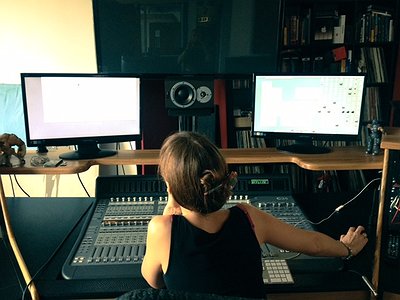Part 2
What do improvisation and composition mean to you and what, to you, are their respective merits?
Every composition starts with improvisation which creates an abundance of ideas. Composition is the process of identifying which of these ideas are usable and developing them further.
Do you feel it important that an audience is able to deduct the processes and ideas behind a work purely on the basis of the music? If so, how do you make them transparent?
This is a question I’ve had to ask myself with regards to the concept of my piano album. I don’t think it is important or is particularly possible to do this because music is so subjective. Everyone listens to music for different reasons and consequently has different responses and experiences. As composers we would probably like our listeners to understand the concept, processes and ideas behind the work. However, this is a mildly self-indulgent perspective. Music is so powerful. It evokes so many different types of emotions and responses. We shouldn’t suffocate this exploration by dictating how a person should listen to it.
With more and more musicians creating than ever and more and more of these creations being released, what does this mean for you as an artist in terms of originality? What are some of the areas where you currently see the greatest potential for originality and who are some of the artists and communities that you find inspiring in this regard?
The word ‘originality’ makes me feel uncomfortable. I don’t think artists should be forced to be ‘original’. I understand the concept. After all, we are a race who enjoys variety and the advancement in technology has created a new era of urgency to seek this before fully appreciating the new variation we have just discovered. However, I think we should be encouraging artists to be true to themselves. This will in turn allow for originality, after all, no personality is the same. If you truly believe in the music you are creating it will be original because it is a strong representation of who you are. I think we are missing out on hearing from extremely talented artists out there with tons of potential just because they don’t appear to be ‘original’ enough. Having said this, there are artists out there who are massively pushing the boundaries and rightly deserve the recognition they receive. Their ideas excite and inspire me.
How would you define the term “interpretation”? How important is it for you to closely work together with the artists performing your work?
Interpretation is subjective. Working with others becomes a collaborative process which develops a concept. If I’m working with dancers and animators I want them to enjoy the creative experience as much as me. I don’t want them to feel like their creativity is restricted because I’m a strong believer that the best work happens when someone has artistic freedom. Therefore, it’s extremely important that I work closely with them with the aim of inspiring each other.
The effect of a piece doesn't merely depend on the performance of the musicians, but also on the place it is performed at. How do you see the relationship between location and sound? In how far do you feel the current system of concert halls is still the right one for your music – or for contemporary music in general?
It is massively important. Sometimes it's the intricacies in a piece that can make it magical and these may be lost in the wrong performance space. Also a performance is not just hearing the music, it's an experience. The ambience of a place can also contribute to a listener's appreciation of the music.
For me, the space will vary depending on the project. If it’s a film score this is obviously best performed in a cinema with a kick-ass sound system. For the piano album launch party I didn’t want to use a traditional classical music venue because I didn’t feel it was wholly representative of the style of the album. So in this scenario I’ve prioritised ambience over acoustics. I’ve also found a venue with a nice sounding piano which is always super important.
What's your view on the role and function of music as well as the (e.g. political/social/creative) tasks of composers today - and how do you try to meet these goals in your work?
There are so many roles and functions of music in the world. Each culture has their own role and function, some dictated by religion others not. Similarly the tasks of composers is vast partly because of their intentions or the purpose of the music.
Do you have a musical vision that you haven't been able to realise for technical or financial reasons – or an idea of what music itself could be beyond its current form?
I'm not always able to create a piece of music how I hear it in my head. This is partly due to technological reasons because I find it challenging to create the sound I can hear inside my head. The dynamic range and timbral intricacies of my orchestral compositions are not always fully realised because I have been unable to record a full orchestra for financial reasons and am therefore having to use software instruments. This is most frustrating because although software instruments have wonderful capabilities, I never feel they have the depth of sound quality that a live orchestra has.






